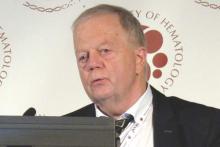ORLANDO – A combination of two standard therapies and the newly approved targeted agent daratumumab was associated with a high overall response rate and induced rapid, deep, and durable responses in patients with relapsed or refractory multiple myeloma, according to results of a phase I/II study presented at the annual meeting of the American Society of Hematology.
The median time to first response was 1 month; median time to best response was 5.1 months; and the median duration of response had not been reached at the most recent analysis. At 1 year, 91% of 26 patients with a partial response or better had not experienced disease progression. The 18-month progression-free survival rate was 72%, and the 18-month overall survival rate was 90%.
“I have been looking forward to this day since I dosed the first patient with daratumumab in 2007. We have come a long way,” Dr. Torben Plesner said at a briefing at the meeting.
The study is one of several trials examining the use of daratumumab (Darzalex) in various combination regimens. Daratumumab (Darzalex) was recently approved by the Food and Drug Administration as monotherapy for use in patients with relapsed or refractory multiple myeloma for whom three or more prior lines of therapy, including proteasome inhibitors or immunomodulators, have failed.
Updated data on an expansion cohort from the study show that the combination of lenalidomide and dexamethasone (len/dex) with daratumumab was associated with an 81% (26 patients) overall response rate (ORR). This included stringent complete responses (sCR) in 25% (8 patients), complete responses in 9% (3 patients), and very good partial responses in 28% (9 patients), and 6 partial responses
“The responses were durable and they occurred rapidly,” said Dr. Plesner of Vejle Hospital and the University of Southern Denmark in Vejle.
Dr. Plesner presented updated results from the expansion cohort of the GEN503 study looking at the combination of daratumumab and len/dex.
In the open-label, single-arm study, patients received 16 mg/kg intravenous infusions of daratumumab once weekly for the first 2 months, twice weekly for months 3 through 6, and once every 4 weeks thereafter, plus oral lenalidomide 25 mg on days 1 through 21 of every 28-day cycle, and oral dexamethasone 40 mg once weekly.
In the dose-escalation phase, patients with relapsed multiple myeloma following two to four prior lines of therapy were enrolled. In the expansion cohort phase, patients with relapsed disease after at least one line of therapy could be enrolled, with no upper limit on the number of prior regimens.
The primary endpoint was adverse events; the most common were neutropenia in 84% of patients, cough in 50%, diarrhea, and muscle spasms (44% each).
Half of all patients had a serious adverse event, but the only events that occurred in more than one patient were neutropenia (three), gastroenteritis (two), and pyrexia (two). Infusion-related reactions, primarily during the first infusion, occurred in 56%, and the severity was grade 2 or less. Reactions were managed either with premedication or by slowing the infusion rate.
Two randomized phase III studies of the combination of daratumumab and len/dex are ongoing: the POLLUX trial, looking at the drugs in patients with relapsed/refractory disease, and the MAIA trial, using the combination as first-line therapy for newly diagnosed patients.
Speaking about the wealth of new therapies for multiple myeloma and other hematologic malignancies discussed at the briefing, Dr. Robert Hromas, professor of medicine at the University of Florida in Gainesville, commented that “I’ve been in the field for years and I can’t explain the excitement among blood doctors. It’s extraordinary, but we see plateaus lasting years now.”
“It’s so much fun to be a blood doctor,” he added.
The GEN503 trial is sponsored by Janssen. Dr. Plesner disclosed serving on an advisory board for, and receiving research funding from, Janssen. Dr. Hromas had no relevant disclosures.


